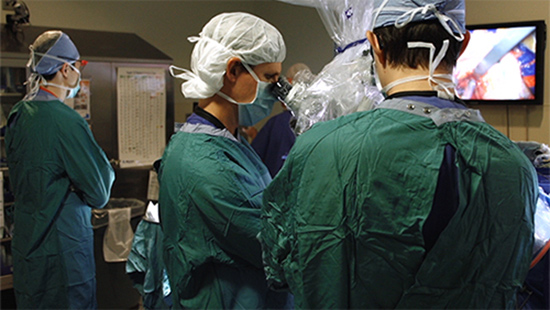Skull Base Tumors

Skull base tumors are lesions that occur deep in the skull. They vary by type and exact location. But when surgery is the chosen treatment, your surgeon needs the most advanced navigation capabilities to remove the tumor with the least disturbance to the surrounding tissue.
At the University of Maryland Medical Center (UMMC), our skull base tumor team, which has experts from a number of different specialties, utilizes an intraoperative surgical navigation system that guides the surgeon with imaging technology, improving precision and accuracy and maximizing patient safety. Post-operative care in the Neurocritical Care Unit (NTCC) with its advanced monitoring equipment helps our team safeguard patients during the recovery process.
UMMC's program provides rapid access to innovative therapies and groundbreaking clinical trials for both malignant and benign tumors in a patient-friendly environment.
You'll be in the hands of a team of experts — ranging from neurosurgeons and oncologists to rehabilitation specialists and nurse coordinators — who embrace a team approach to care. Together they ensure patients receive advanced, personalized and comprehensive treatment.
Types of Skull Base Tumors
While there are many kinds of tumors that occur in the skull base, these are some of the more common ones we treat:
Meningioma – Often benign, these tumors start in the thin tissues covering the brain and spinal cord. They can occur anywhere in the skull including the base.
Pituitary tumors – Most of these tumors on the pea-sized "master" endocrine gland are not cancerous. Because the pituitary controls the other glands, these can cause hormonal imbalances. Read more about pituitary tumors.
Acoustic Neuroma – These rare, usually slow-growing tumors are usually benign. Because they develop on the nerve leading from the inner ear to the brain, they can lead to hearing and balance problems.
Treatments
As an academic medical center, our doctors have access to the latest technologies and research to guide their treatment choices — whether it be open surgery or a minimally invasive technique.
For some skull base tumors we may offer stereotactic radiosurgery. This treatment gives a very precise dose of radiation, which means fewer side effects than traditional radiation treatments. For patients with complex tumors, our team also partners with the Maryland Proton Treatment Center, which offers a highly advanced and precise form of radiation therapy.
Recovery
To ensure the best care for patients following procedures, we have developed highly effective clinical pathways to guide treatment after surgery. Our aggressive post-operative care approach reduces complications and allows for close monitoring of patient progress throughout their stay.
Rehabilitation
Comprehensive neurorehabilitation programs are available at a variety of locations through the Center for Skull Base Surgery in conjunction with the University of Maryland's Post-Acute Care Network. Under the direction of neurologists, physiatrists and specially trained therapists, patients learn to maximize their function and resume normal activities.
